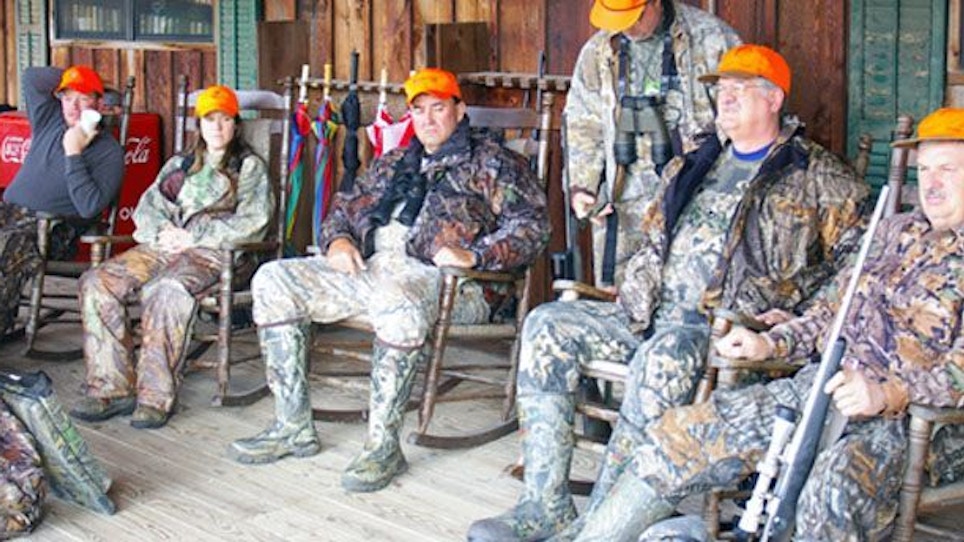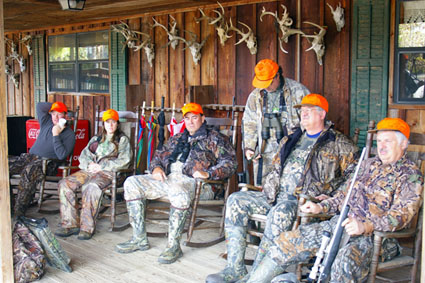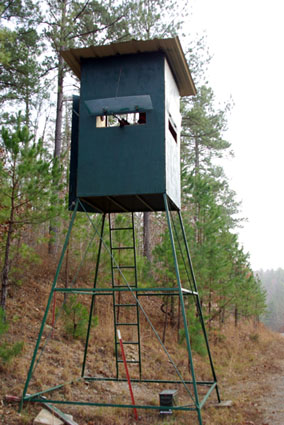Benefits of a Hunting Club
|
A club forms a focal point for deer hunters with common interests, but starting a new club is not a task to be taken lightly. |
Being a club member has many benefits. A traditional hunting camp is available every season, and unwanted hunting can be controlled legally and effectively.
Hunting a club also gives sportsmen a focal point. You know before you arrive at camp where deer are likely to be feeding, trails they use, bedding areas and so forth. There’s less need for extensive scouting and more time for hunting.
Having a hunting club also can assist with management goals. For example, in some areas, hunters see too many does and few older bucks with good racks. Good management — reducing doe numbers and allowing bucks to age more before being harvested — can remedy this. But for effective management, you need a land parcel larger than most of us can afford to buy or lease on our own. Having a club solves the problem, but how do you get one off the ground?
Ask Questions and Set Rules
Start by talking with potential members. Make sure you all have similar ideas about management. Do most members want venison for their freezers or a chance at big-racked bucks? Will there be a point restriction, such as a minimum of four points on one side for a buck to be legal? Decide such things up front and prepare written rules. Each member should sign and receive a copy, and rules should be posted. Record details so there’s no second-guessing how the club runs.
Things to consider include whether you can bring guests to hunt, how many and what they can harvest. Decide whether there will be a penalty if bucks not meeting requirements are accidentally shot, and what the penalty will be. Most clubs limit the number of bucks a member can kill, and a few make hunters harvest a certain number of does to keep the population well-balanced. All rules should be spelled out and enforced.
Finding Your Hunting Club Land
|
One advantage of owning or leasing land for a deer-hunting club is being able to put up permanent stands that provide regular hunting spots for members. |
Finding the right property is the next step. That means finding a landowner willing to sell or lease the right land. You should decide first, however, which option best suits your club: leasing or purchasing.
If leasing, consider contacting a local wildlife officer, biologist or agricultural-extension agent. These people often know of good deer-hunting properties being leased to control deer or trespassing problems. Chambers of commerce might be able to provide additional contacts with timber companies or other businesses interested in leasing hunting rights.
Although usually more expensive, dealing with a real estate company can provide leads when nothing else works. These businesses get a cut of the lease or sale price, so most go the extra mile to help you find hunting land.
Also watch for advertisements in the classified ads of newspapers and outdoor magazines. You can also run your own ad noting your desire to lease deer-hunting land.
When you find a likely parcel, do lots of research before closing a deal. Is it a good price for the acreage, location and resources on it? Is it near enough to members’ homes that it’s practical to hunt as often as you want?
Also investigate how nearby landowners and clubs manage their property. Deer won’t likely stay on your land, so if they’re hunted hard, with yearling bucks shot on all surrounding lands, you won’t get the results you want unless it’s a large parcel.
Other considerations include:
Access: You need a decent road in and trails, dirt roads or ATV paths that allow you to retrieve bucks or put up stands.
Building codes: If your club wants to construct a camp building, know in advance if the structure you have in mind is permitted.
Game regulations: In some areas, a club may be able to obtain extra doe tags to help get the herd in balance. In order to get these extra tags, you might have to keep records of deer weights, ages, sex, condition, etc., but you’ll want to do that anyway.
With leases, you’ll want answers to additional questions. For example, ask the landowner if there are conflicting land uses anticipated for the tract. It’s hard to hunt deer when a clearcut or strip mine suddenly appears on your lease.
Talk with the Landowner
Spend time with the landowner and learn as much as possible. Will he permit your group to carry out management practices like prescribed burning, planting food plots, etc.? Are you being granted total hunting rights or will he let his friends and family hunt there as well? Who will maintain roads and gates? Will the landowner allow as many hunters as you wish? Are land boundaries well marked? If not, who will mark them? What will be the cost and length of the lease? Will he require the club to maintain a liability insurance policy?
When you reach a full agreement on terms, get the lease and all particulars in writing. Make your lease a legal document, consulting an attorney if necessary.
It takes lots of legwork to locate prime deer-hunting areas available for sale or lease, and you’ll want to spend time selecting the right group of people to form your club. If you're willing to make the extra effort, however, forming a club is one of the best ways to be assured of a quality deer-hunting experience.








